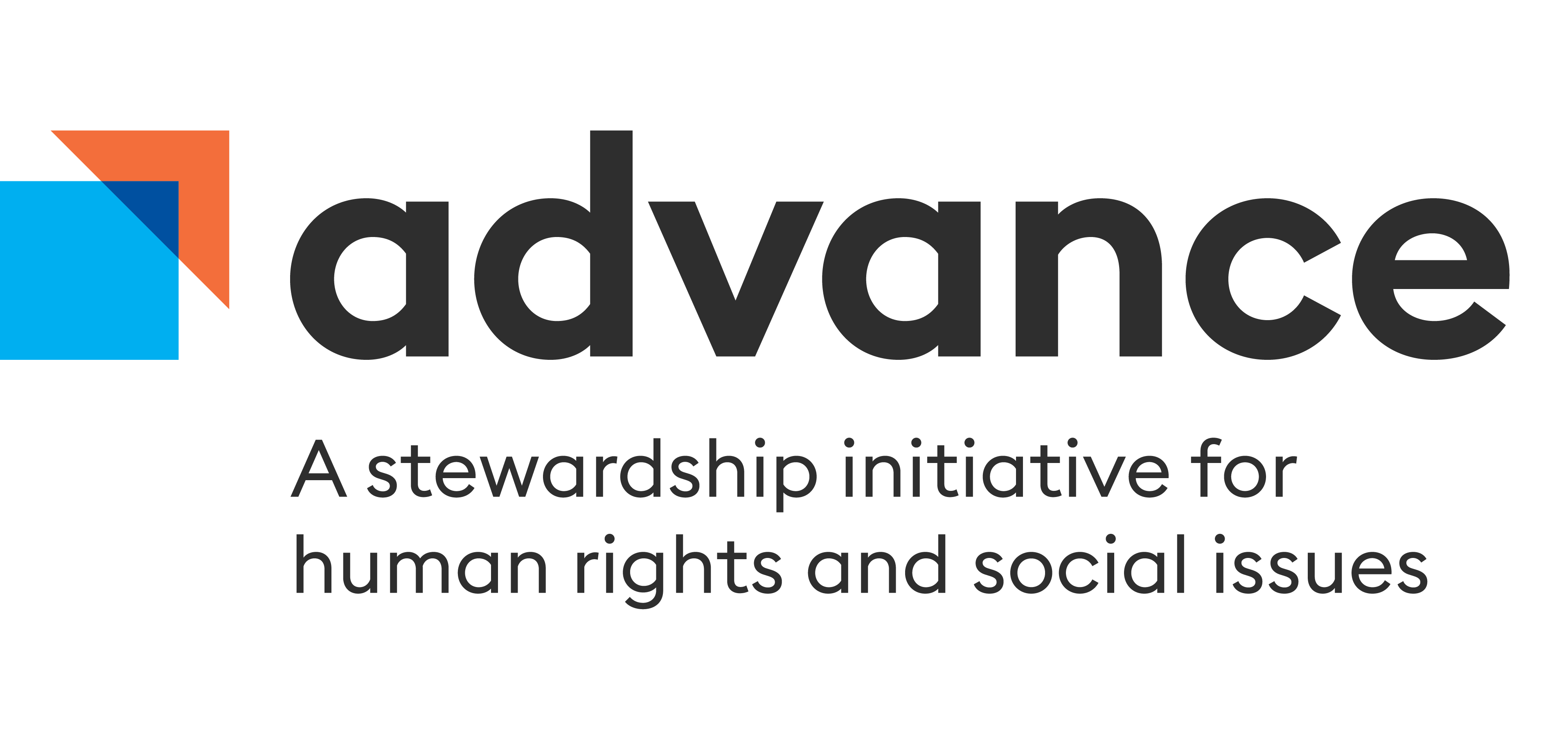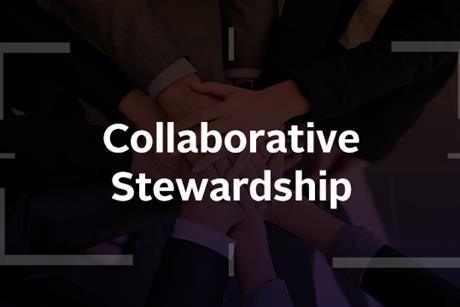Advance: a stewardship initiative for human rights and social issues
About the Initiative
As outlined in the PRI’s position paper: why and how investors should act on human rights, investors have a key role to play in addressing social issues and human rights.
The PRI is launching a new stewardship Initiative where institutional investors will work together to take action on human rights and social issues. Investors will use their collective influence with companies and other decision makers to drive positive outcomes for workers, communities and society.
Within the Initiative, the PRI will support a range of activities, including investor collaborative engagement with companies, along with potential further escalation where needed. The PRI will also support investor engagement with policymakers and other stakeholders to make progress on the overall goal.
For more information on this Initiative, please contact [email protected]
General questions about the Initiative
What is the objective of the initiative and what is your strategy to achieve this?
The overall objective of the Initiative is to advance human rights and positive outcomes for people through investor stewardship. The Initiative will primarily seek change through investors’ use of influence with portfolio companies. The following three expectations will be set for engagement focus companies:
- Fully implement the UNGPs –the guardrail of corporate conduct on human rights
- Align their political engagement with their responsibility to respect human rights
- Deepen progress on the most severe human rights issues in their operations and across their value
Why is the PRI well placed to coordinate such an Initiative?
The PRI is a network of over 4000 signatories who collectively manage more than US$100 trillion in assets under management. The PRI executive has been coordinating investor stewardship Initiatives for 10 years, including prior collaborative engagements on human rights within specific industries, including within cobalt sourcing, agricultural supply chains and the extractives industry, as well as more recently playing a key role coordinating collaboration within Climate Action 100+, the world’s largest investor collaborative engagement.
As a UN-supported body, the PRI has a strong commitment to progress on human rights and the UN Guiding Principles, as most recently articulated in our position on human rights and 2021-2024 strategy
The PRI will work closely with organisations coordinating similar Initiatives, to ensure alignment and avoid duplication of efforts
How will the PRI work with existing collaborative initiatives?
We will work closely with existing investor initiatives to ensure that we are not duplicating efforts or sending mixed messages to issuers – which may undermine broader investor efforts. For example, we have a Collaboration Agreement with the Investor Alliance for Human Rights (IAHR). Given the complementary nature of both Investor Alliance and PRI’s work on the investor responsibility to respect human rights in their investment activities, and in light of the vast effort that lies ahead to address these responsibilities across various asset classes and investments in different sectors, coordination between the organisations will be beneficial both to achieving the strategic objectives in this regard and to improving the human rights situation of people around the world. Coordination will also ensure that Investor Alliance and PRI deploy their resources in a way that is synergistic and minimises the likelihood of engaging in duplicative efforts or working at cross-purposes. The Collaboration Agreement is intended to ensure positive collaboration and further each organisations’ strategic objectives.
Is this a collaborative engagement?
Yes. Recognising that addressing human rights will require a variety of stewardship tools and activities, the PRI will support a range of these activities, such as engagement at AGMs and public policy engagement. However, the primary efforts of the Initiative will be delivered through engagement with companies in collaboration with other investors.
How will the Initiative draw on the expertise of investors and other stakeholders?
The Initiative will be facilitated by the PRI Executive and supported by two voluntary advisory bodies:
-
Signatory advisory committee: this group is comprised of PRI signatories and provides guidance to the PRI on the development and coordination of the Initiative to support the PRI’s decision making. Applications for this committee were open from 30 August to 19 September 2021.
-
Technical advisory group: this group is comprised of PRI stakeholders, such as NGOs, with deep expertise on human rights. The technical advisory group will provide technical advice on human rights to inform the PRI Executive’s decision-making around the development and strategy of the Initiative. The technical advisory group will also support engagement with affected stakeholders.
More information on these groups can be found further down this page.
How will progress of the Initiative be monitored and reported?
Progress will be monitored through a combination of tracking company performance over time against company benchmarks (such as the World Benchmarking Alliance’s Corporate Human Rights Benchmark (CHRB) information received from Lead and Collaborating Investors on engagement progress and tracking progress on outcomes (going beyond changes in policies and processes). This approach is in development, working closely with the Initiative’s advisory groups.
Will the PRI introduce a benchmark framework, similar to Climate Action 100+?
At present, the PRI will rely on existing public benchmarks (such as those developed by the WBA), rather than developing our own benchmark.
What happens after the deadline of 14 July?
Investors will be assigned to the company engagement groups. Applications will remain open for company engagement groups where there are spaces available. For company engagement groups that are full, investors will be able to join the waiting list. Endorsers are welcome to sign-up throughout the duration of the initiative.
When will the initiative be launched?
We expect to begin engagement after September 2022.
How long will phase 1 of the Initiative last?
Phase 1 will continue to run throughout the 5 years of the Initiative unless decided otherwise. Future phases (with additional focus sectors and companies selected) will start from 2023. Phases will then run simultaneously rather than in sequence.
Questions about the engagement strategy
What will the asks/expectations be of companies?
It is widely recognised that striving for global respect for human rights is complex and will require varied approaches across different businesses, regions, and sectors. However, at a high-level, each company will be expected to fully implement the UNGPs, align their political engagement with their responsibility to respect human rights and deepen progress on the most severe human rights issues in their operations and across their value chains.
Why was political engagement singled out as a focal point for investors?
- Under the first set of expectations around full implementation of the UNGPs, all stakeholder engagements should be respectful of human rights, however, more often than not, this is an area where companies’ political activities go against their stated commitment to respect human rights.
- Corporate political engagement that is not undertaken in a responsible manner (including indirect activities - indirect lobbying activities include membership in or links to trade associations and business groups; engagement in international or national business alliances or initiatives; contributions to external, or non-governmental organisations) often undermines efforts to achieve global respect for human rights.
- Public policy is a necessary tool to ensure the implementation of the UNGPs. Policy can help support global human rights aims both directly – e.g. minimum wage regulation and freedom of association regulation – but also indirectly, through enabling of better governance – e.g. through mandatory due diligence legislation, protecting the voice of indigenous communities, protection of voting rights for minority communities and elimination of corruption and other forms of policy capture.
- Long-term universal investors (i.e. diversified investors) have an interest in the policy engagement of portfolio companies being aligned to their interests in regulation that protects human rights.
What sectors and companies will be engaged?
Engagement will begin with companies in the metals & mining and renewables sectors. The engagement focus sectors and companies, along with the methodology for selection can be viewed at the top of this page. These lists were developed in consultation with the Initiative’s Signatory advisory committee and technical advisory group.
How many companies will initially be engaged?
We expect to begin engagement with approximately 30-40 companies. This number will grow as we recruit additional investors and increase the PRI’s internal team capacity.
How will human rights issues at each company be prioritised?
For each company, the PRI with input from the advisory groups and right-holders and affected stakeholders – will identify (and agree with each Lead Investor/s) which issues should be prioritised for engagement by assessing where actual or potential negative outcomes for people are most severe using the criteria set out in the UNGPs
- Scale: gravity of the actual or potential outcome on an individual right(s) (“how serious is the harm”?)
- Scope: the number of individuals that are or will be affected (“how widespread is the harm?”)
- Irremediable character: any limits on the ability to restore those affected to a situation at least equivalent to their previous situation (“if the harm occurs, can it be put right?”)
What are the specific activities for engagement?
We expect that activities such as sending investor letters and holding company engagement meetings will form part of the engagement. Ultimately, it is the responsibility of the Lead and Collaborating Investors to develop an engagement strategy that is suitably ambitious and effective to drive change around the objectives of the initiative. We encourage investors to consider other tools, such as filing shareholder proposals.
Are investors required to vote and escalate engagements a certain way?
No. We encourage investors to be assertive through their stewardship activities, but we will not state that an investor should engage or vote in a certain way. The PRI will encourage investors to develop an engagement strategy and consider the different tools available to them, should they need to escalate an engagement, but investors are always responsible for making their own escalation and voting decisions.
How will investors respond to human rights controversies within the Initiative?
The requirement to adopt and implement the UNGPs will apply to all companies selected as part of the engagement. However, where a human rights controversy has occurred related to a company outside of the engagement focus list, the PRI (with input from the technical advisory group and advisory committee) may consider responding by assessing the severity of the controversy.
If decided that the controversy should be responded to, a new company engagement group will be formed. The engagement in this case will focus on mitigation of issues; reassurance that company has a remediation plan in place which includes consultation of all affected stakeholders; and reassurance that the company integrates learnings and reviews established procedures to prevent the reoccurrence of the controversy.
How will right-holders and affected stakeholders be included within engagements?
The PRI in collaboration with Lead Investors and with input from the technical expert group will identify and consult stakeholders who have or may be affected by companies (such as local communities and workers). Leading investors within the industry already do this, and it is particularly important when a controversy occurs that requires investors to be reactive.
Obtaining first-hand information from key stakeholders will complement the human rights impact assessment conducted by the company itself and other public information available. This will help investors to understand and incorporate information about actual risks and outcomes experienced by stakeholders in individual engagements.
What role will investor policy engagement play in the Initiative?
Both investor engagement with corporates and public policymakers are necessary to pursue the objectives of this Initiative. It is recognised, for example, that the solution to the issues of privacy rights, hate speech, misinformation and electoral manipulation brought on by big tech companies require not only forceful company stewardship by investors but also global, regulatory solutions.
Separately to the collaborative Initiative, as part of our broader human rights programme, the PRI will promote mandatory human rights due diligence legislation, robust accountability mechanisms and financial regulation which recognises human rights as an area of responsibility through local PRI policy representatives.
Within the collaborative Initiative, a separate, voluntary working group on investor engagement on public policy will be considered (from year 2 of the Initiative onwards) where issue-specific policy and regulatory intervention is required. This will be subject to decisions in the wider PRI change plan on human rights and will build on input from the Signatory advisory committee, technical advisory group and other stakeholders.
Questions about signatory involvement
What roles are available for signatories?
Signatories will be able to apply to join the Initiative as an “Endorser” and/or a “Participant”.
Endorsers:
Endorsers are PRI Signatories that publicly endorse the Initiative by signing the public investor statement, signalling their support for the objectives of the Initiative. Endorsers who outsource their stewardship activities are encouraged to request that their investment managers and engagement service providers with responsibility for engagement apply to take part in the Initiative or commit to aligning their own engagements to the objectives of the Initiative. Endorsers do not participate in engagement activities within the Initiative and will be listed separately to Participants in public information about the Initiative
Participants:
Participants are investors who engage with companies as part of the Initiative. Participants are expected to engage with at least one engagement focus company for the duration of the engagement period. Participants can engage with a company as a “Lead Investor” or a “Collaborating Investor” for specific engagement focus companies. Investors who join the Initiative as a Participant will also be listed as Endorsers of the Initiative.
What will be the joining criteria for Participants?
Participants are typically required to meet the following minimum requirements for joining the Initiative:
-
Be a PRI Signatory asset owner, investment manager, network group or engagement service provider (with a specific mandate to engage with companies on behalf of an institutional investor(s))
-
Commit to participate in the Initiative as a Lead or Collaborating Investor for at least one company
-
To have made a policy commitment to respect human rights and implemented a human rights due diligence process; or to commit to work towards doing so within a year of joining the Initiative. The policy commitment and due diligence processes should cover, at a minimum, the human rights included in the International Bill of Human Rights and International Labour Organization’s Declaration on Fundamental Principles and Rights at Work and the eight core conventions. Further information on implementing a policy commitment and due diligence process can be found in the PRI’s paper: Why and how investors should act on human rights
-
Commit to devote sufficient time to the Initiative and Initiative duties, as set out in these Terms
To join, Participants must agree to sign the Initiative public Investor statement and agree to the Terms of Reference for the Initiative.
Are there any joining requirements for Endorsers?
The only requirement for Endorsers is to be a PRI signatory. Whilst we do not require Endorsers to have made a policy commitment to respect human rights and implemented a human rights due diligence process, it is strongly encouraged as outlined in the PRI’s paper: Why and how investors should act on human rights.
How will Participants be selected?
Endorsers and Participants are required to sign-up to the Initiative by completing an application form. Endorsers will be asked to provide their contact details and organisation logo. Participants will be invited to complete a more comprehensive application form including questions on their suitability to engage with each company selected.
In reviewing these applications, the PRI will take into account the following considerations:
-
Demonstrated experience of stewardship, especially company engagement but also other stewardship tools/activities relevant to the Initiative, such as filing shareholder resolutions
-
Demonstrated experience or knowledge of human rights and social issues
-
Leverage with engagement focus company (e.g., stock/bondholding over the term of the Initiative)
-
Pre-existing engagement relationships with company
-
Geographic proximity to engagement focus company and knowledge of local market
-
Specified requirements requested by existing engagement group (e.g., the engagement group may specify that an additional large investor headquartered in the country the engagement focus company is based in would strengthen the influence of the engagement group)
Are smaller investors (in terms of AUM) at a disadvantage during the selection process?
No. Although the size of the investor may be taken into account (e.g., if this may increase the leverage with the engagement focus company), other criteria will be taken into account, including demonstrated experience of stewardship, knowledge of human rights, pre-existing relationships with the company and geographic proximity to the company.
Is this Initiative open to bondholders?
Yes. The initiative is open to all that can exert influence with companies.
Is the Endorser role only available to asset owners?
No, investment manager and servicer provider PRI signatories can also sign-up to Advance as an Endorser.
Is there a fee to sign-up to the Initiative?
There is no fee to sign-up as an Endorser or Participant.
Are Participants required to commit to engagement for the full five years?
It is strongly encouraged that Participants take part for the full duration of the engagement. However, recognising that circumstances may change, there is no formal commitment to do so.
Can investors join the Initiative at any time?
Investors can sign-up as an Endorser at any point. The ability to sign-up as a Participant will be dependent on the availability of company engagement group places. Some groups may still have spots available. Where the group is full, investors can join the waiting list.
In phase 2, the PRI will add new sectors and companies to the focus list, so there will also be an opportunity to sign-up at this stage.
Can an investor sign-up as an Endorser and become a Participant in the future?
This is possible but is dependent on the spaces available in the company engagement groups, and whether the investor meets the joining criteria.
Can an investor participate in multiple company engagements?
Yes, this is possible, but given the anticipated high level of demand, the PRI may not be able to allocate the investor to all the companies the investor expressed an interest in engaging with.
What are the reporting requirements of Participants?
Participants are required to provide annual high-level reports back to the PRI Executive on their level of participation and progress of the engagement. Collaborating Investors are required to submit a shorter report than Lead Investors, detailing their level of participation in the Initiative.
Note, this is separate and unrelated to the PRI Reporting Framework.
What is the needed commitment from Endorsers?
Endorsers do not participate in engagement activities. Endorsers are simply required to sign the investor statement, showcasing their support for the objectives and strategy of Advance.
Endorsers who outsource their stewardship activities are encouraged to request that their investment managers and engagement service providers with responsibility for engagement apply to take part in the Initiative or commit to aligning their own engagements to the objectives of the Initiative.
Questions about human rights
Aren’t human rights only relevant for states?
The UN Guiding Principles on Business and Human Rights (UNGPs) and the OECD Guidelines for Multinational Enterprises (OECD Guidelines) articulate that businesses have a responsibility to respect human rights that exists independently of a state’s duty to protect human rights. Where a state falls short of its human rights obligations, businesses must still, to the greatest extent possible, adhere to higher international standards.
Since the publication of these guidelines, the Office of the High Commissioner for Human Rights (OHCHR) and the OECD have explicitly stated that both frameworks apply to institutional investors as business enterprises.
As an investor, how can I be expected to judge what is right?
The UNGPs and the OECD Guidelines do not ask an investor to judge what is right. Rather, they outline an institutional investor’s responsibility to respect internationally recognised human rights. These should be understood, at a minimum, as those outlined in the International Bill of Human Rights and the International Labour Organisation’s Declaration on Fundamental Principles and Rights at Work.
Cultural differences mean different human rights norms, don’t they?
The UNGPs are applicable to all states and business enterprises, regardless of size, sector, location, ownership and structure. Similarly, the OECD Guidelines are a series of non-binding principles and standards for responsible business conduct in a global context consistent with applicable laws and internationally recognised standards. This means that the UNGPs and OECD Guidelines outline what is expected of all businesses, regardless of geography.
The most severe human rights outcomes will, however, vary from country to country. This is one of the reasons business enterprises need to carry out due diligence aligned with the UNGPs and OECD Guidelines – by doing so, they can address the most severe actual and potential negative human rights outcomes across different contexts.
As a minority investor, do I have influence?
The OHCHR has outlined that the UNGPs apply to all institutional investors, including minority investors, as echoed by the late Professor John Ruggie.
Institutional investors, including those that are minority investors, are expected to build and use leverage to change the behaviour of investees. Through collaborative engagements and public policy dialogues, among other Initiatives, investors can fulfil their responsibility to prevent and mitigate harm to people. Minority investors should not underestimate their leverage, as doing so undermines the drive to garner respect for human rights.
The influence of minority investors was demonstrated in a de facto test case brought against two institutional investors by a group of NGOs. The complaint was related to their minority investment in a controversial Korean steelmaker. The parties eventually reached a joint agreement, with one investor committing to prevent and mitigate harm to people caused by their minority shareholding. It was in response to this case that the OHCHR issued a clarification on the responsibility of minority investors to respect human rights.
Advisory groups
The initiative will be facilitated by the PRI Executive and supported by two voluntary advisory bodies.
Signatory advisory committee
The signatory advisory committee is made up of PRI signatories and will provide guidance to the PRI on the development and co ordination of the initiative to support the PRI's decision making.
Technical advisory group
The technical advisory group is comprised of PRI stakeholders, such as NGOs, with deep expertise on human rights. The group will provide technical advice on human rights and support engagement with affected stakeholders.









